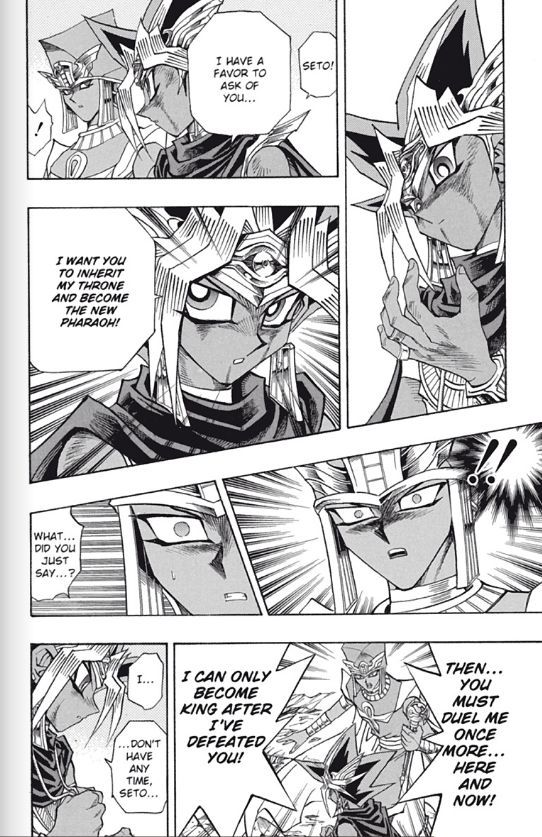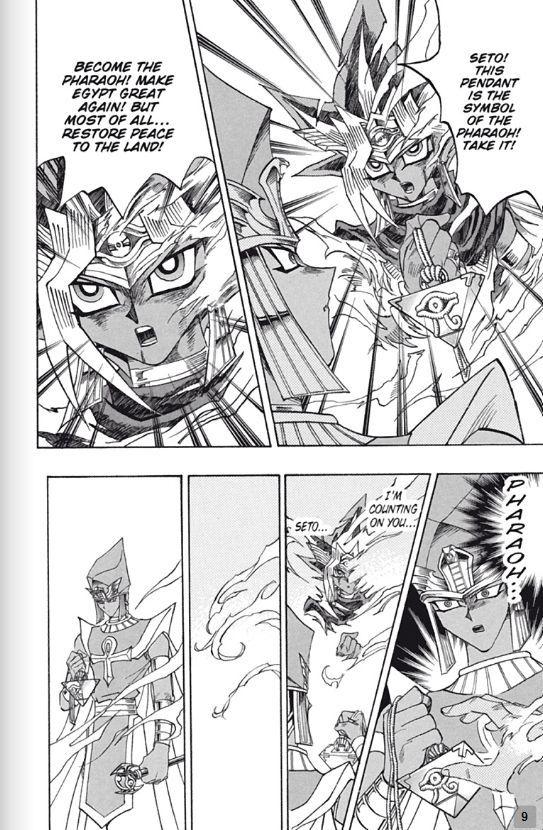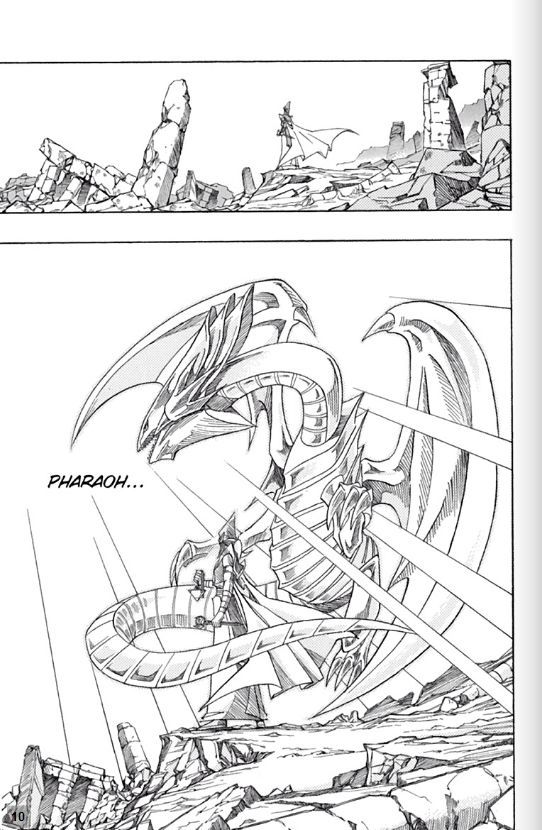#atem regressing a bit makes sense to me
Text
I know the morality play of the Raphael/Atem duel gets...weird, a little bit. There's a bizarre emphasis on how Raphael believes it's selfish and wrong to carelessly send monsters to the graveyard and that gets played up in this duel, but...many, many previous duels have showed how sacrificing monsters and having them in the graveyard can be a good strategy, and work to one's advantage. It isn't always such a terrible thing. Atem using catapult turtle to win a duel is not exactly a new strategy for him, he's done it before, and it's far from the worst thing he's ever done if we consider season 0 canon. and yet the episode frames that as the big indicator of Atem "giving into darkness" which.........eh?
But. There is something deeper at play in this duel that goes far beyond how people treat their trading cards. The real problem here- and Yugi will spell this out later- is that Atem struggles a bit with empathy, but he especially struggles with it when his pride is on the line. This duel really had no stakes in it- Raphael tells him the professor is fine, and he states point blank he isn't going to use the Seal of Orichalcos- there is nothing to lose here.
But the two of them bet on their "sense of justice" at the start. To Atem, this is a very black and white morality. Atem's sense of justice tells him that Doma and any working with it are wrong (objectively true) and therefore anyone working with them is also evil (less objectively true). He can't quite see that the enemy in front of him might not be Bad with a capital B. Good is good, bad is bad, so if you're doing bad and working with bad- you're bad. Even if he respects you as an opponent. But what he can't really see is that Raphael is, fundamentally, a good person making bad choices because he's been hurt. Raphael basically spells it out for him, and he still can't see it.
So in many ways, this is the world view that Atem is betting on in this duel- Raphael is working with the organization that's trying to destroy the world, therefore he's evil, and Atem is good. And Atem has to be good, right? He's fought evil, he's won, he's not bad, he's not dark like the others who use milliennium items, he's not the "evil intelligence" Pegasus warned of in the manga and he definitely couldn't possibly have been an evil Pharaoh when he was alive...right?
And that's the other thing Atem can't admit, and it's what Raphael calls him out on most directly- Atem can't admit to his own darkness. He can't acknowledge the darkness in his heart, the potential for evil in everyone. Things have to be black and white for him, because if not...what is he? And it's so easy for Raphael to dig into this insecurity, it is so easy for him to make Atem doubt his own goodness- because he doesn't know who he was, does he? But he can't believe it, can't make himself believe he was a bad person before, and he definitely can't believe that he could be now. This is what's at stake for Atem during this game- it's his entire sense of self, really.
And this logic is actually deeply consistent with the earliest version of Atem- season 0/first manga arc Atem, and I'd argue, the morality play of this duel only really works when you consider that first arc/season 0. Stay with me now.
In season 0, Atem challenged "bad" people to shadow games with the intent that the game would decide who was right or wrong based on the outcome. The losers of his earliest shadow games usually lost because they couldn't follow the rules based on some character flaw. The games exposed their weaknesses and they paid the price for it. This was why he was always so confident- he was acting based on his sense of justice, and was absolutely certain in the correctness of his position (which, to be fair, was usually "save Yugi and/or his friends from literally dying), so...it wasn't necessarily an incorrect stance. Atem was doling out some pretty harsh penalty games, but he wasn't wrong about the flaws of these people he challenged.
What we never did was consider whether or not these people really deserved the punishments they were given. Did a high school bully really deserve to be tortured into insanity? Did an escaped criminal deserve to be burned alive? All justice, no empathy. But is that really justice at all? Now to be fair, with Yugi's influence Atem does calm down a lot over the course of season 0 and into Duel Monsters canon. He becomes a much better person. But we never exactly see him express remorse for the penalty games he inflicted, either. We never see him question his choices, or whether he was right or wrong.
Games are form of justice to him. To lose a game is to be in the wrong. He never lost, therefore, he was never wrong.
This inability to question his own beliefs and actions, to consider his own capacity for darkness, and to truly empathize with the person on the other side of the field, is what leads to him losing the test Raphael gives him. It is why he can justify playing the Seal himself- the methods don't matter to Atem in the moment- if he wins, he was right, he was good, and he's always been right and good, and that is all that matters because his sense of self is actually really fucking fragile if the outcome of a card game can shatter it- so he plays the Seal.
It reminds me of a quote from Avatar- "Pride is not the opposite of shame, but it's source." Atem is someone with an enormous amount of pride- and an equal amount of shame lingering just under the surface. Because I think that question Pegasus first posed to him- that question of evil- has been festering for a long time. I think Atem knows, deep down, that his early shadow games were wrong, they weren't that different from Pegasus or Marik or even Doma themselves- but he cannot go there with it, cannot let himself question it. I'll get into this more later, but Yugi will later tell him that in his doggedly stubborn sense of pride and honor, he can't hear others' pain or suffering. And I think this stubborn clinging to his sense of pride is a way of masking his own pain and suffering too, his own deeply felt shame- because Atem can't really hear that either.
Until he loses the game. Until he loses Yugi, and it shatters his pride completely, breaks him wide open.
#yugioh#atem#this is very rambly I hope it is coherent#...might have to make another post on how yugi and atem balance each other out because while yugi is an expert at the empathy thing#he sucks at the justice part#and ideally you want a bit of both#anyway#the writing is actually much better here than people give it credit for sorry if you watched the dub#anyways this is atem's best character arc by far and I'm so sad it's technically filler lol#...you could argue this slightly undercuts the earlier arc in duelist kingdom about him overcoming his fear of losing#but it's not really the same thing imho#this is less about the fear of losing his pride for pride's own sake#it's more about the fear that losing means he's been wrong all this time about who he is#more about the fear that he's not a good person after all#which again I think makes more sense if you consider season 0#so in that context#atem regressing a bit makes sense to me#anyways this is long I just have a lot of thoughts and feelings about this character lmao
11 notes
·
View notes
Text
YGO-DSoD: on Seto, Pride and Soul.
So the two week airing of DSoD has come to pass. Luckily I got an Obelisk card on one of the days I went, but even after watching Dark Side of Dimensions twice, there was a nagging feeling that I might’ve forgotten something, so I took a memory walk to figure out what it was...
~ The following blog post covers some thoughts on Seto Kaiba in the movie ~
(It’s also sorta, lightly spoilerish. Read at your discretion...)
A common remark I often hear from viewers is that Kaiba is super extra in DSoD, and that his obsession with Yami soared to even greater heights in the movie... Well, yes, though I can see that (for various reasons)... I feel like Kaiba’s outrageous desires in DSoD regarding Yami/Atem make a lot more sense and don’t come as a surprise if you consider this Kaiba as mangaverse Kaiba. The many differences in circumstance and nuance between his anime and manga counterpart gives a different perspective on the subject.
From what it looks like, the movie seems to stem more from the mangaverse than as a continuation of the anime; perhaps because Takahashi had a hand with this particular movie... (albeit, the atmosphere is rather reminiscent of the old show). I brought this up because it’s an important background for the following...
In the manga, Kaiba parted ways with Yami and the others after the conclusion of the Battle City tournament. He flies off to continue his dreams of corporate success, with a promise to battle Yami again. In the anime however, he ends up spending pretty much filler season and final season with Yami and co; also going to the World of Memories, and even seeing the final duel between Yami and Yugi. --- Well, since none of that happened in the manga... What does this mean? It means he never parted ways with Yami properly, never had another duel with the man, and likely did not even find out Yami passed on until sometime afterward. If you notice, in the movie during the flashback of Yami’s passing, Kaiba is missing from the scene. It’s a bit of a kicker ‘cause throughout the series Yami explains to Kaiba how the answer to losing isn’t death. Although the reason for his passing is understandable to his friends and us as viewers, this is probably quite a sucker punch to Kaiba.
He was essentially robbed of the continuation...of closure, and this goes back to that nagging feeling I mentioned. Actually, that wasn’t even the first time Kaiba had been robbed of closure with his ultimate rival. The other time was this...



(Speaking of which, this scene was a lot more beautiful and poignant in the manga than the anime.)
So, anyway...what ends up happening afterward is that Priest Seto turns out to be a really decent ruler. He erects a stone tablet of their battle and rivalry, rebuilds Egypt, and essentially paves a way for the future and for the Pharaoh’s return. Kinda ironic that several thousand years later, the same soul that wanted Atem to be at peace is the same soul that’s trying to wake him from his slumber and wreck his tomb... But this... this really highlights a core, subtle aspect of the connection between the two. Throughout the centuries that passed, regardless who bested him, Kaiba’s soul yearned to battle with specifically with one person, and no one else. Perhaps because of a vague emptiness stemming from eons ago with Pharaoh Atem, or perhaps simply because Yami (by Kaiba’s own words), is that which propels him to greater heights. Who knows. One thing is certain is that when he duels, he’s reminded of Yami, and when he loses he’s reminded of Yami. There was even a point in Duelist Kingdom where he seemed to have met his end and his final thoughts were that of Yami. Let’s just say his obsession never let up and has always been at max level XD.....it just so happened to be condensed in DSoD.
One of the scenes that stuck out in the movie for me was when Yugi confronted Kaiba, trying to explain to him that Yami would never return. Because he and Yami shared a literal, spiritual bond, Yugi feels this way even more so and urges Kaiba to move on... Except towards the end, when the one in question does return, Yugi concedes and is utterly impressed by Kaiba’s unwavering faith in Yami’s existence, when he himself stopped believing. Kaiba thus retorts that he too has a unique bond with the Pharaoh. It’s interesting to note the difference between the two when you think about it. Yami and Yugi share a literal bond, being in the same hosts; but often times they didn’t really see eye-to-eye. Sometimes Yugi doesn’t know or understand what Yami thinks or feels. They’re two separate entities with really different personalities; originally, many of their values didn’t align; that was something that developed throughout the series. Yugi and his friends are a foundation of emotional strength and source of comfort for Yami, whereas... Kaiba is a source of intellectual growth for him, a bolster for his confidence, the affirmation of his values, as well as fuel for his competitive livelihood. When it comes to dueling (with and against each other), Kaiba and Yami progress in sync. On the offhand, not that he intended to be helpful, but throughout the series Kaiba has been quite the resource for Yami. Kind of just like in the past, when Priest Seto was a great and scary ally/enemy to the Pharaoh. There’s so much parallel between the past and the present, it’s hard to talk about it in one go.
Themes of the past and the future really blurred in this movie. It could be that Kaiba’s just bat-crap-insane, but to me Kaiba never felt like he was regressing and obsessing over the impossible, but rather his state of being is always progressive-thinking and doing the unthinkable. He gambles, but he never plays with the intent of losing and that’s what makes him revolutionary. Though, it’s also interesting to note that Kaiba hates notions of the past; because his interest lies only in the future...it’s then questionable whether Yami/Atem is part of his past or his future. Again the line blurs there. Questions worth tweeting to Takahashi-sensei.
Alrighty, this thought post is getting a bit long so I’ll end it talking about the final scene. No one but the author will ever know what Atem was thinking at the end there, but he didn’t seem surprised, like he expected Kaiba...or expected no less from Kaiba. Anyway I’m glad Kaiba got his wish, and became something like a god of tech. Space couldn’t hold all of his ego so he had to partition some of it to another dimension, aha...
205 notes
·
View notes